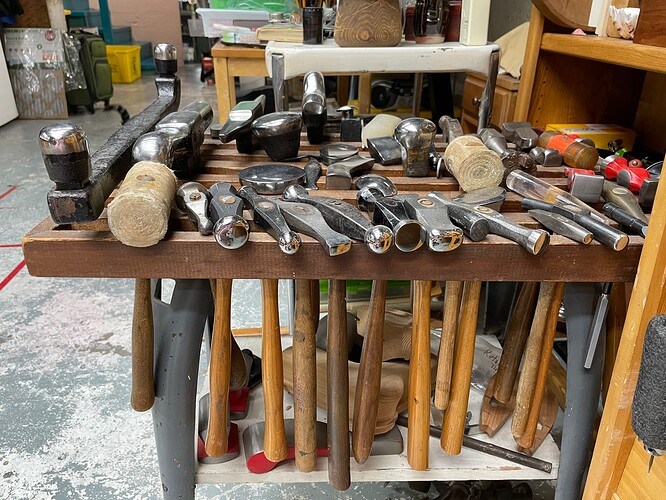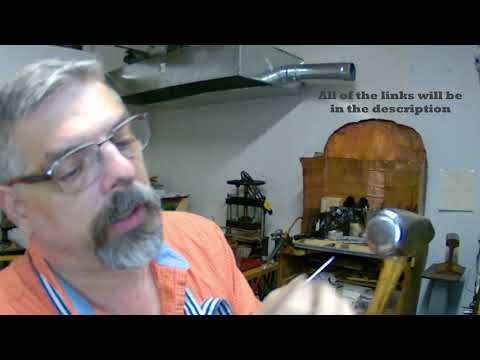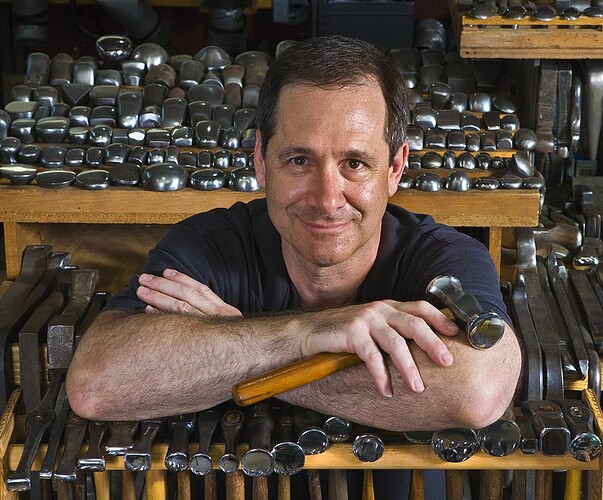No matter how careful I am with my good hammers, they seem to always get scratches on the heads that transfer to my silver. I don’t understand how they can get so scratched up so quickly! Is this just the nature of the beast? Any advice on preventing this, as well as scratch removal?
Yes it is, just keep your hammers polished. You can look for compounds specific to steel and use a separate wheel for each. Remember that your anvil will also transfer scratches, so polish it as well. This is a constant battle and you need to decide where to fight it. You may decide to just polish the silver when you are done with everything else. Great question and good luck…Rob
Greetings Loretta
Polishing is the work I dread. I like to think I am good at it but it is hard on my hands. My only advice is time taken beforehand to clean up tool faces is time well spent.
I am using the same ball peen hammer that Rob’s and my father used. The difference is that while Dad used it for everything he dressed the face on that hammer often. I use it mainly for stretching out bracelets and polish the face often as I go. Not to say Dad was a clumsy Craftsman. Far from it. Dad worked with in the manner and style he learned on the reservation during WWII, picking up new techniques as he went along. And he polished his work well. He was never limited by his tools.,
I use a very heavy Harbor Freight Brass hammer for punching and stamping and a much lighter polished ball peen for planishing. The ball faces are polished as well.
Rob’s point about what and when you polish is something to consider. All of the little steps we take in our process goes to create our finished look and style. And Dad always pointed out to me that I should make sure any mark I made in the work was one I wanted there when I was done polishing.
Keep working and have fun.
Don Meixner
Hi. My name is Jo. I have a hammer addiction. For the first few years of my metal smithing career I fell in love with, forging, raising and planishing hollow ware and flat wear. I quickly learned how important hammer and anvil/stake care are. I’ve spent many many hours smoothing and polishing both.
For starters, it’s important to store and protect them properly. I keep mine on a rack and arrange them so that the polished surfaces don’t touch or scratch each other. I also use McGuire’s liquid spray car wax to protect them from moisture, oxidation, dust, and dirt. A little trick I learned from the great silversmith Jeffery Herman. Rather than use oil or grease that attracts and holds dust, the McGuire’s wax allows the dust to just slide off. Now that said, it is also super important that the surface of the metal that you are hammering be absolutely clean and un oxidized. Even a stray hair can mar the metal you are hammering.
As for finishing.and polishing. When I do get a scratch on a hammer surface… If it’s superficial I use a fairly fine emery like 400-600 at first. I sand it in one direction. Then I sand in the opposite direction to make sure that the scratch is gone. Then I go to 800 in the opposite direction to make sure that all of the 600 lines are gone. Then again with the 800 as I did with the coarser grits. Once that is done I use a yellow stitched buff with bobbing compound until all the 800 surface is gone. Again in multiple directions. Then Osbourn Graystar polishing compound, followed by Osbourn White Polishing compound. All can be found at Rio Grande. Be sure to remove any traces of the compounds between steps and after finishing. Then wax. Good luck. -Jo
very helpful, thanks so much!
thank you!
Prevention is a matter of making sure you store your tools so they do not rub and clank against each other. If you have room to do it, hanging racks are the best. As to why polishing, I did a YouTube video on this a few months back.
Jo: maybe you can help? I love what you explained about McGuire’s and I’d aspire to have the stakes that clean. I find myself in a wonderful and overwhelming situation where the studio I’m now using has an abundance of tools and a shortage of maintenance. I’m taking it on and realize it is too much for one person. Easily 100 different stakes along with as many hammers. I used simichrome to tidy up the rolling mill. Someone had used it with a wet (perhaps pickle) piece of metal. I was almost in tears. It looks better and I’ll continue with it. AND with so many stakes, not constantly being used. How best to clean them and then protect them? I do take note of the progression on to the osbourn compound for ‘refinishing’ a marred stake. So, how to keep unmarred hammers & stakes free of rust? Thank you Jo.
There are many rust preventatives used by machinists. Many are partial to Boeshield T-9. It was developed by Boeing as a rust preventative for airplane parts. I find it keeps my less frequently used tools free of rust, and I live very near the ocean.
Spray on a thin coating and it dries to a waxy, protective film that also lubricates. It’s not cheap but a little goes a very long way.
Elliot - thank you very much for this information. I’ll add it to my possibles list Do you have a cleaning method that you use before applying the Boeshield t-9?
I have read the literature and am very impressed. Thank you.
I see it comes as a liquid as well. I have lung issues and wonder if the liquid applied to a clean micro fiber would be good to apply without putting particulates in the air. Your thoughts are welcome. Ventilation with aerosols is always on my list of cautions.
TX
Jo, I’ve google searched McGuire’s wax and can’t find it. Link if possible? Thank you.
Wiping it on with a paper towel of any sort will work. Or just pour a small amount into a squat, wide-mouthed container dip the faces of your hammer or stake into it and let the excess drip off. Pretty much any way you can get the stuff onto the surface you want to coat will work.
search for this - or just go to a car supply place - odd spelling. [meguiars car wax
Sure, I saw that but was using your original spelling of the item. Thank you!
Sorry! Bad spelling on my part. Meguiar’s Shine As You Dry Quik Wax. It’s available online and in many hardware and auto supply stores. Under 10 bucks for a bottle. It sprays on and only needs a quick dry with a soft cloth. My husband Timothy W Green and I live in Oregon where it rains… a lot. We have a basement studio and the Meguiar’s has worked well for us. I also use it on my larger silver raised pieces and our copper kitchen countertops after I clean them. However if you live near the ocean then I’d go with Elliot’s suggestion of the Boeshield product. Just to make you all drool. Here’s a photo of Jeff Herman the guy who turned me onto Maguires"s
with just a VERY small sampling of his hammers and stakes. And a link to his tutorial on how to refinish hammer faces. Refinishing Silversmith Hammers with Jeff Herman - YouTube
Jo
A dozen or so years ago, one of the members introduced a great compound he called brownpolymer (search the archives). Back then I wrote:
I am not one to sing the praises of many products, but I have to say
I was very pleasantly surprised in my use of the Brownpolymer stuff.
For example. I have a couple of large sheets of 1/8th in steel under
my soldering area, including my pickle. I was having a lot of
rusting (as you would expect near acid), so I sanded them down,
polished them and oiled them up. They still rusted. I refinished the
worst one, but used the Brownpolymer on it- I was surprised, very
little rust - it works! You find some great tricks on Orchid.
I do believe this will work well on other tools like hammers. I have great respect for Boeshiled (developed for aluminum I think) and know that McQuire’s makes very good stuff as well.
LOVE LOVE LOVE what you educated me on AND the plethora of hammers. I’m still drooling. I’ll have to take a photo of all the stakes and hammers that I’ve been ‘charged with’ bringing back to luster and life. Oregon is damp for sure. The Boston suburb in which the studio I’m helping is Dedham, about 8 miles from the ocean but near ponds and other waterways. I’m excited about watching the youtube with Jeff because I’ll be teaching a very basic class about tool maintenance and care. Along with basic metal techniques. He will inspire me!
I FLINCHED when he scratched that hammer head!!!
No wonder Jeff has a smile on his face.
thanks for sharing… beautiful shiny polish!


